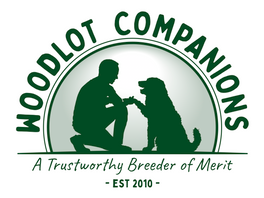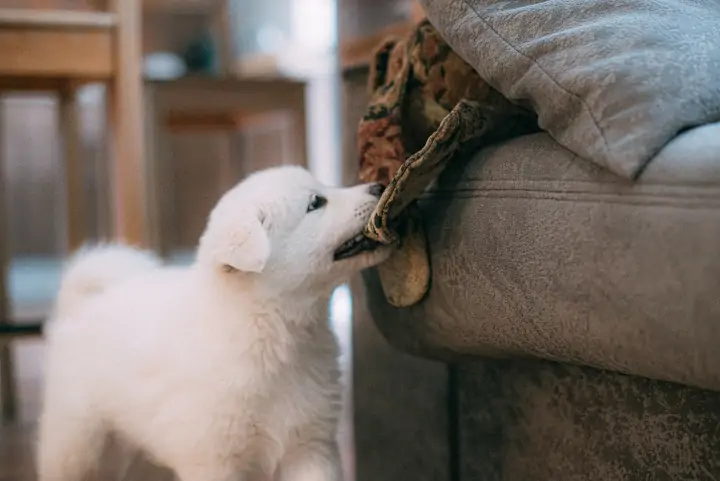How Do I Stop My Puppy From Biting Me?
All puppies have the sweet, but hurtful habit of nibbling on us and though it can be cute it’s not a habit you want to keep. It is especially important to address if you have children since they have a puppy-like energy that attracts your furbaby to behave the way they did with their siblings. This inclination to bite is a form of communication that is practiced between littermates. With all their time being filled with playing, chewing, and investigation in those first days – the world is explored primarily with their mouths. Puppies often use these bites with their littermates not only in play, but as a way to establish pack pecking order and left unchecked can be a way your new bestie tests boundaries. While this practice can be endearing at seven weeks old, it quickly becomes a pain filled behavior once they’re more than a few months old and getting bigger by the day. For these reasons it’s important to help your puppy learn to curb these mouthy manners.
The ultimate goal is to train your pup to stop mouthing and biting people altogether, but to get there it’s important to teach him or her that people have very sensitive skin. So, just like when teaching young toddlers – gentleness is the aim and must be taught with patience and consistency. A dog is born with the ability to control the force of their bite, but doesn’t yet understand that human skin does not have the protection of fur like their siblings did and will bite too hard even in play. So a natural way to show your best buddy that his bites are too much is through play. This will also encourage bonding between you and your new pack mate.
How to Create A Safe Puppy Environment For Your Kids
Start by letting them mouth your hands then when a bite is too much, we suggest yelping and pausing play for a moment by having your hand go limp. Your puppy should be naturally taken aback and will also stop playing. This way your puppy will realize gentleness is needed just like they did when their littermates yelped to express their bites were too hard. After a short pause play can resume. If yelping seems to have little effect a stern, “no biting” can be used instead. When your puppy stops, praise them for it. Then you can resume playing – always bringing correction when needed. In the case where your little buddy just doesn’t seem to get the message close his or her mouth while giving the, “no biting” command and do not resume play. This gives the message that gentle play will continue, but painful play stops. Over time tighten up the rules of what is considered a hurtful bite until your puppy can play with you very gently, controlling the force used to little or no pressure at all. Keep in mind that however rough you play with your puppy they will match your intensity, which could lead to firmer bites as a form of defense.
You will want to avoid jerking your hands or feet away from your dog when he or she nips at you as they will see it as an encouragement to jump forward and grab at you. When choosing to initiate play, do not wave your fingers or toes in front of your puppy’s face or lightly slap the sides of their face. This will most likely coax your pup to bite harder than you’ve trained them to and undo all your hard work. It’s very important that everyone in the family follows these guidelines and puts safe play into practice, so that strong bonds can be formed with your furry friend. We also highly suggest puppy play dates or trips to the dog park to get the abundance of energy they have out. There are some great toy options on our Amazon Idea List to bring along and have on hand. This will help them be less motivated to play roughly with you as well as making sure your puppy is well socialized, which is important to their overall development.
If your work through play does not translate to non-play times and your furry friend randomly comes and starts nibbling at you, a clap with a firm, “no biting” should be effective. This will be an important command for the younger members of your family to use from the time your new pack member comes home because of the puppy-like energy they have that we mentioned earlier. You can then redirect their attention to a toy or bone. Alternately, if your furbaby tries to mouth your hands while trying to pet them or even when grooming, you can distract with a small treat in one hand while brushing with the other to help them get used to being touched. If problems persist and this habit continues to be a problem we suggest contacting our preferred puppy trainer, Kimberly.
Going From Biting to Bonding with Your Puppy
Turning those love bites into sweet kisses takes little encouragement – and possibly a bit of peanut butter or another tasty treat! Just as those little nibbles are natural, showing affection with kisses for your little bestie is too. Maybe you’ve found that your furry friend prefers too many kisses or you’d like those licks to be on your hand and not your face. In order to curb these affections we suggest a firm, “no thank you” with simple redirection by removing them from your space and giving a toy or bone. We don’t suggest a treat in this case, as your pup would begin to think this is how to act in order to get a treat unless you would like to teach them to lick your hand instead of your face. Then the redirection should be to gently move their mouth to your hand and say, “kisses here” then when they lick reward them with a small treat.
Giving kisses where and when you want to can be taught with consistent use of a command such as “give kisses” while gently directing them to your cheek. When you’ve had enough move them away, pat their head, then offer a toy or bone. If teaching them to lick your hand instead of your face is a challenge then placing a bit of peanut butter on the back of your hand can do the trick and also doubles as a treat! Remember, however much kisses you encourage and allow your pup to give will be what they think is acceptable as they grow and mature, so if you allow a lot as a puppy this will be challenging to change when their older. Again, if more help is needed in this area of training especially if you have an overly affectionate pup, Kimberly can assist with more tips and tricks. We do advise not training this habit out completely as it is a way your new pack member bonds and communicates with you. As with all training, we hope that turning love bites into sweet kisses will strengthen the bond between you and your cuddly companion!



